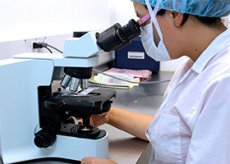New publications
Medical professionals will soon have to adjust their treatment of cancerous tumors
Last reviewed: 02.07.2025

All iLive content is medically reviewed or fact checked to ensure as much factual accuracy as possible.
We have strict sourcing guidelines and only link to reputable media sites, academic research institutions and, whenever possible, medically peer reviewed studies. Note that the numbers in parentheses ([1], [2], etc.) are clickable links to these studies.
If you feel that any of our content is inaccurate, out-of-date, or otherwise questionable, please select it and press Ctrl + Enter.

Scientists from Switzerland have developed an ultra-modern technique that involves the use of artificial receptors as amplifiers of the immune response to the development of a cancerous tumor.
Specialists are constantly working to improve the possibilities of cancer treatment. After all, oncology is considered one of the main problems in world medicine. So, relatively recently, doctors have begun to more actively use immunotherapeutic drugs to stimulate the body's own forces in the fight against tumors.
The development of immunotherapy is ahead of all forecasts. However, it must be admitted that drugs that stimulate the immune system are not effective in every case. This is the problem that scientists from the Federal Polytechnic College of Lausanne have been thinking about. Researchers have managed to think through the creation of dendritic vaccines: now they can be "adjusted" to any tumor directly inside the patient's body.
Dendritic antigen-presenting cellular structural elements are an important link in the immune system. They have the ability to "photograph" pathological structures and report them to immune defenders - T-killers.
To produce a dendritic anti-cancer vaccine, doctors need to separate dendritic structures from a patient's blood sample and "acquaint" them with cancerous foreign substances - antigens - in the laboratory. What does this give? The cancerous tumor will eventually no longer be able to ignore the patient's immune system.
The effectiveness of dendritic vaccines is encouraging. However, the treatment has a number of conventions. The downside is that dendritic structures have to be combined with antigens of a tumor grown "in a test tube". Since each cancer process is unique, the created vaccine may be ineffective in some cases. It would be better if it were possible to use antigens directly from a specific patient's tumor.
Specialists led by Professor Michelle de Palma have practically solved this problem. They created artificial receptors that "photograph" foreign antigenic substances of a specific cancer process. At the moment, the mechanism looks like this: dendritic structures are isolated from the blood, connected to extracellular vesicular receptors and reintroduced into the patient's body. Once in the blood, the receptors detect cancer enzosomes and inform T-killers about them.
It turns out that the "acquaintance" of dendritic structures and antigens occurs not in a test tube, but directly in the patient's body. Experts claim that this immunotherapeutic technology will help to really overcome most types of solid cancer - in particular, breast cancer.
Thus, the new method will significantly increase the therapeutic capabilities of antitumor vaccines. "We use the term "crossdressing": dendritic structures transmit an image of antigens to immune cells. This is an unexpected and effective method of programming immunity that does not require heavy and conditioned molecular connections," explained Dr. de Palma.
Details of the scientific work are presented in the journal Nature Methods.

 [
[